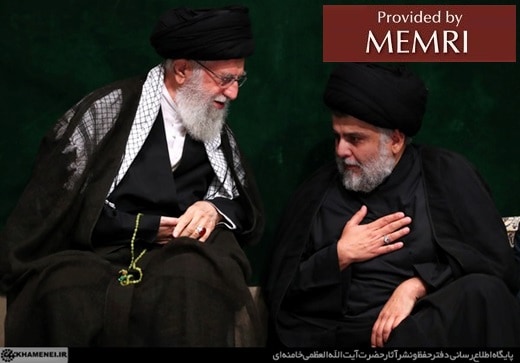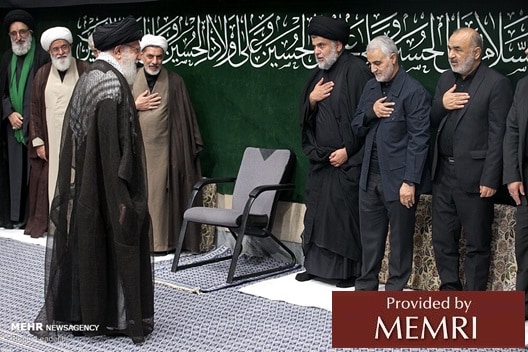The Ashura[1] ceremony held annually by the Iranian regime was attended this year by Muqtada Al-Sadr, a senior Shi'ite leader in Iraq known for calling to preserve Iraq's political independence. Moreover, Al-Sadr was given a place of honor beside Iranian Supreme Leader Ali Khamenei, taking precedence over high-ranking military commanders such as Qods Force commander Qassem Soleimani, Islamic Revolutionary Guards Corps (IRGC) commander Hossein Salami, and others. It is noteworthy that Iranian President Hassan Rohani was absent from the ceremony.
Al-Sadr's presence at the ceremony had not been publicized in advance. According to the pro-Iranian Lebanese daily Al-Akhbar, Al-Sadr has been staying in Iran for the last three months.[2]
The photos below, posted September 11 on the website of Iran's Supreme Leader (farsi.khamenei.ir) and also published the same day by Iran's official news agency Mehr, show Al-Sadr sitting beside Khamenei at the Ashura ceremony, with Soleimani and Salami on Al-Sadr's other side.



The Significance Of Al-Sadr's Presence Beside Khamenei
The public appearance of Muqtada Al-Sadr – a prominent Shi'ite Iraqi leader who has called for Iraqi political independence – alongside Khamenei, the leader of the Islamic Revolution in Iran, indicates his return to the Iranian regime's orbit of influence after several years in which he preferred to distance himself from this regime. One of the factors that prompted his rapprochement with Iran is presumably the rising status and strength of the Hashd Al-Sha'bi (Popular Mobilization Units – PMU), the umbrella organization of Shi'ite militias in Iraq affiliated with Iran and at the same time embedded in the Iraqi army, a possibility which seriously threatens Al-Sadr's power in Iraq.
Another possibility is that Al-Sadr's visit to Iran is actually part of his efforts to keep Iraq independent and prevent it from becoming a theater of struggle between Iran, the U.S. and Israel, a struggle that has escalated recently with the aerial attacks on bases of the Iran-backed militias in Iraq and threats by officials in these militias to attack U.S. interests in response.[3]
Hizbullah Secretary-General Hassan Nasrallah: We Will Not Abandon You, Khamenei
In an Ashura ceremony in Lebanon, on September 9, 2019, Hizbullah Secretary-General Hassan Nasrallah called Khamenei "the Hussein [ibn 'Ali] of our time" and declared that Hizbullah will never abandon him, referring to the events of the Battle of Karbala in 680CE, in which Hussein ibn 'Ali, the Prophet's grandson and the third Imam of Shi'ite Islam, was martyred. This battle is the pivotal event in the struggle between the Shi'ites and Sunnis for domination of the Muslim world, which continues to this day. According to Shi'ite tradition, Hussein and his companions were abandoned by the Muslim community and left alone to face their enemy, the Sunni Caliph Yazid bin Mu'awiya, and were consequently killed in battle.
In his speech Nasrallah said: "On the day of Hussein, the day of Ashura, we reiterate our position, as a part of the Resistance Axis. We are not, and we never will be, neutral in the battle between Truth and Falsehood – the battle between Hussein and Yazid. To those who think that the hypothetical war – if indeed it takes place – would bring an end to the Resistance Axis, I say with force, honesty, and determination, [while keeping in mind] the sacrifices of the Resistance Axis, that this hypothetical war would spell the end of Israel and the end of American hegemony and presence in our region. This axis, this camp, which is headed by the leader and imam sayyed Khamenei… From here in Lebanon, I say to the whole world that our imam, our leader, our dear sayyed, our Hussein of this time is the honorable Imam Sayyed Ayatollah Ali Al-Husseini Khamenei, and I say that the Islamic Republic of Iran is the heart of the [Resistance] Axis, its main hub, its most staunch supporter, and its true, powerful, and genuine leader...
"To our sayyed, our imam, Imam Khamenei, we say… To you, our sayyed, our imam, and our Hussein, we say what Hussein's companions told Hussein on the eve of the 10th of Muharram: Our sayyed, our imam, our leader, even if we knew that we were to be killed, burned, and spread to the wind, then resurrected, killed, burned, and spread to the wind 1,000 times over… Even if the Americans and the Zionists were to do this to us 1,000 times over, we would not abandon you, oh son of Hussein!"
To watch a MEMRI TV clip of excerpts from his speech, click below:
[1] Ashura, the tenth day of the month of Muharram, is a day of mourning in Shi'ite Islam. It marks the martyrdom of Hussein ibn 'Ali, the grandson of the Prophet Muhammad, in the Battle of Karbala in 680CE. This year Ashura took place on September 9.
[2] Al-Akhbar (Lebanon), September 12, 2019.
[3] It should be noted that, in response to the airstrikes, Al-Sadr issued a statement saying that, in preparation for retaliatory action, the Iraqi government must quickly investigate the attacks, even under international oversight, and stressed that the debate on retaliatory action must take place in Iraq "without the intervention of countries that [either] oppose the Israeli and American presence in the region or are seeking to reconcile with them and do not close down the [Israeli and American] embassies [in their territory]." In his statement he also called to avoid making militant and emotional declarations, to keep weapons exclusively in the hands of the state and to surrender all weapons caches – otherwise Iraq will be in grave danger. Twitter.com/Mu_A;Sadr, August 26, 2019. In November 2018 he tweeted that "our neighbors are our friends, not our masters," referring to Iran. Twitter.com/Mu_AlSadr, November 27, 2018.




